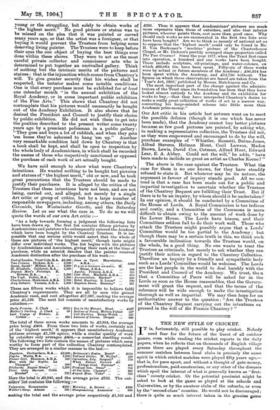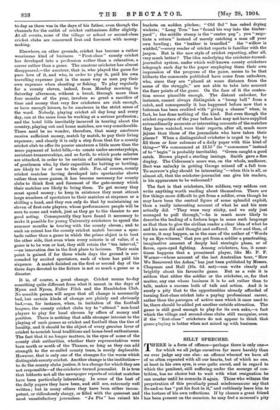THE NEW STYLE OF CRICKET. to-day as there was in
the days of his father, even though the charnels for the outlet of criaket enthusiasm differ slightly. At all events, none of the village or school or second-class cricket clubs are concerned first and foremost with money- making.
Elsewhere, on other grounds, cricket has become a rather wearisome kind of business. " First-class " county cricket has developed into a profession rather than a relaxation, a career rather than a game. The amateur cricketer has almost disappeared,—the amateur, that is, who played the game for pure love of it, and who, in order to play it, paid his own travelling expenses just in the same way as men pay their own expenses when shooting or fishing. To play regularly for a county eleven, indeed, from Monday morning to Saturday afternoon, without a break, through more than four months of the year, involves so great a sacrifice of time and money that very few cricketers are rich enough, or have enough leisure, to be amateurs in the strict sense of the word. Nobody, playing cricket all day long and every day, can at the same time be working at a serious profession; and the hotel bills inevitably incurred in touring about the country, playing out and home matches, are very considerable. There need be no wonder, therefore, that many amateurs receive sufficient money, match by match, to pay their living expenses ; and clearly it is only a step from that for a county cricket club to offer its poorer amateurs a little more than the mere payment of hotel-bills,—to create under-secretauships, assistant-treasurerships, and so forth, to which posts salaries are attached, in order to be certain of retaining the services of gentlemen who, by their capacities for batting or bowling, are likely to be of use to the club. For, of course, county cricket matches having, developed into spectacular shows rather than mere games, it has become necessary for county clubs to think first and foremost of the gate-money which their matches are likely to bring them. To get money they must spend money ; to keep in existence they must attract large numbers of spectators to their matches at sixpence or a shilling a head, and they can only do that by maintaining an eleven of first-rate players, whose performances people will be sure to come and watch, just as they go to the theatre to see good acting. Consequently they have found it necessary to make it possible for young University cricketers to spend the summer months in touring with the county eleven; and to such an extent has the county cricket match become a spec- tacle rather than a game in which the prime object is to beat the other side, that even when every minute is of value, if a game is to be won or lost, they still retain the "tea interval," —an innovation dm in the first place to laziness. Their main point is gained if for three whole days the ground is sur- rounded by excited spectators, each of whom has paid his sixpence. A match finished on the first or second day of the three days devoted to the fixture is not so much a game as a disaster.
It is, of course, a great change. Cricket means to-day something quite different from what it meant in the days of Mynn and Nyren, Fuller Pilch and the Hambledon Club. No sensible person will argue that all change is necessarily bad, but certain kinds of change are plainly and obviously bad,—as, for instance, when, in imitation of the football leagues, the county cricket clubs try to " attract " non-local players to play for local elevens by offers of money and position. There is nothing that adds stronger interest to the playing of such games as cricket and football than the ties of locality, and it should be the object of every genuine lover of cricket to nourish local traditions and home-bred enthusiasms. The fact that it no longer matters, in the eyes of some of the county club authorities, whether their representatives were born north or south of the Thames, so long as they can add strength to the so-called county team, is surely deplorable. However, that is only one of the changes for the worse which distinguish county cricket. Another change is the institution— to do the county clubs justice, it is a change for which they are not responsible—of the cricketer turned journalist. It is true that hitherto not all the newspaper reports of cricket matches have been particularly interesting. In some of the best of the daily papers they have been, and still are, extremely well written; but in many others they have been either incom- petent, or ridiculously slangy, or filled with the queerest and most unsatisfactory journalese. "Ju Flu" has rained his
buckets on sodden pitches; "Old Sol" has caked drying wickets; "Long Tom" has "found his way into the timber- yard " ; the middle stump is the "centre peg " ; you "nego- tiate a return" instead of merely catching a man off your own bowling; the "leather is trundled" the "willow is wielded,"—every reader of cricket reports is familiar with the jargon. But is the new style of cricket reporting, after all, very much better? The idea underlying the cricketer-turned- journalist system, under which well-known county cricketers telegraph each day to the paper employing them their own impression of the progress of the game, seethe to be that hitherto the comments published have come from onlookers, who, since they are "placed at some distance from the scene of the struggle," are not able to take into account the finer points of the game. On the face of it the conten- tion seems plausible enough. The distant onlooker, 'for instance, cannot always distinguish a "bump ball" from a Catch, and consequently it has happened before now that a batsman has been credited with "giving a chance" when; in fact, he has done nothing of the kind. But even though the cricket reporters of the year before last may not have supplied extraordinarily accurate or interesting accounts of the matches they have watched, were their reports, after all, much more jejune than those of the journalists who have taken their places ? When a distinguished cricketer is urged to help to fill three or four columns of a daily paper with this kind of thing—" We commenced at 1215" (to "commence" instead of to "begin" is probably inevitable). "Green caught a good catch. Brown played a sterling innings. Smith gave a fine display. The Cidermen's score was, on the whole, mediocre. Bert was unlucky in getting George missed off a full toss. To-morrow's play should be interesting "—when this is all, or almost all, that the cricketer-journalist can give his readers, is his appearance to be welcomed?
The fact is that cricketers, like soldiers, very seldom can write anything worth reading about themselves. There are few things more difficult to get from a soldier, even though he may have been the central figure of some splendid exploit, than a really interesting account of what he and his men actually did. "They were very sticky, and we only just managed to pull through,"—he is much more likely to describe the leading of a forlorn hope in some such language as that than to give the civilian reader a clear idea of what he and his men did and thought and suffered. Now and then, of course, it may happen, as in the case of the author of "Words by an Eye-witness," that you get from a soldier a penetrating, imaginative account of deeply laid strategic plans, or of fierce, open-eyed fighting. Among cricketers, too, it some- times happens that a prominent player, like Mr. P. F. Warner—whose account of the last Australian tour, "How We Recovered the Ashes," has just been published by Messrs. Chapman and Hall (10s. 6d. net)—can write clearly and brightly about his favourite game. But as a rule it is seldom that either the soldier or the cricketer, or, for that matter, any one whose business it is to act rather than to talk, makes a success both of talk and action. And it is surely 'a pity that to the opportunities already afforded of turning first-class cricket into a paying professional career, rather than the parergork of active men which it once used to be, there should be added yet another outside attraction. The game is still good enough to play for its own sake,—a fact which the village and second-class clubs still recognise, even if the " first-class " cricketers do not appear to think that game-playing is better when not mixed up with business.







































 Previous page
Previous page